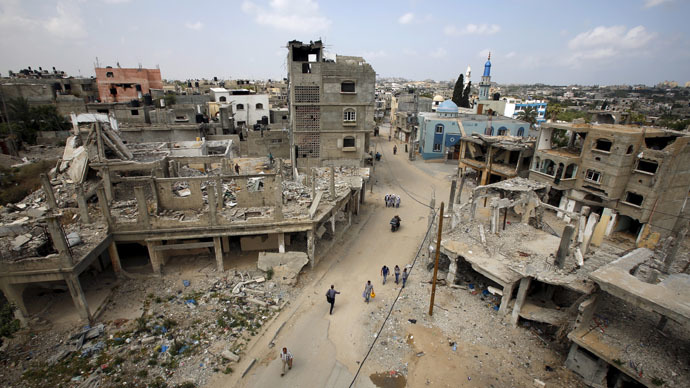A group of prominent former European officials have called on the EU foreign chief to review the bloc’s policy towards the Palestinian issue and find an effective way to hold Israel accountable for its actions in the occupied territories.
In their four-page letter to Federica Mogherini, the former top brass (which includes ex-foreign and prime ministers of France, Spain and Sweden, to name just a few) hold little faith in success for the peace negotiations between Israelis and Palestinians and “urgent action” in order to “construct a coherent and effective policy on the question of Palestine.”
“We maintain our view that the current financial and political assistance given by Europe and America to the Palestinian Authority achieves little more than the preservation of the Israeli occupation of the West Bank and imprisonment of Gaza. The Palestinian Authority’s tenuous grip on the West Bank population’s allegiance has required strong security and other dependence on Israel, funded primarily by Europe and the US. Gaza has shamefully been left to one side,” the group has stated, adding that the re-election of the Israeli PM Benjamin Netanyahu has only made things worse.
Netanyahu has pledged that a Palestinian state would not be established on his watch.
“I think that whoever today moves to establish a Palestinian state and withdraw from territory is giving attack territory for Islamic extremists against the state of Israel,” the Israeli PM told NRG in March.
“Mr. Netanyahu expressed various views on Palestine in and around the recent election campaign, most of them cold to the concept of an independent Palestinian state. We are convinced in our own minds that he has little intention of negotiating seriously for a two-state solution within the term of this incoming Israeli government,” the letter stated.
The former officials also stressed that they have “low confidence that the US government will be in a position to take a lead on fresh negotiations with the vigor and the impartiality that a two-state outcome demands.”
Meanwhile over 500,000 Israelis currently live in settlements in the West Bank and around East Jerusalem which were built after the 1967 Israeli occupation of the Palestinian territories. The occupied territories of the Palestinian West Bank and Gaza Strip have been seeking full statehood and independence from Israel for five decades.
Thousands of people have lost their lives in one of the longest conflicts in modern history. According to the former officials and diplomats, “conditions in the occupied territories remain high on the list of the world’s worst crises in terms not just of political flammability, but also of the denial of international justice, human rights and humanitarian standards.”
In 2012, Palestine were granted non-member, observer-state status in the UN. Its April 1 accession to the International Criminal Court (ICC) became a red letter day for the nation, marking a landmark step in Palestinians’ legal campaign. It’s hoped that the move will help seek justice for Israel’s operation ‘Protective Edge’ last summer, in which thousands of civilians were killed in Gaza.
“Europe should engage with the Palestinians on responsible use of the ICC, recognizing that its powers will be applicable to Palestinian just as much as to Israeli actions,” the former officials stated in their letter.
They have called on the EU to get its priorities straight, adding that the development of relations with Israel and Palestine “would depend on their attitude to progress towards a two-state solution.”
“Europe has yet to find an effective way of holding Israel to account for the way it maintains the occupation. It is time now to demonstrate to both parties how seriously European public opinion takes contraventions of international law, the perpetration of atrocities and the denial of established rights.”
The group says it’s likely that the status of Palestine will come before the UN Security Council later this year.
“EU members of that body should be united in supporting a draft resolution that creates a greater equivalence between Israel and Palestine as political entities in the framework of any new negotiations. If this means recognition of a Palestine government-in-waiting for the territories within the pre-1967 borders, or the setting of a deadline for the negotiation of a two-state solution, the EU should be united in support,” the group stated, noting that “hiding behind American leadership on the politics of the dispute is unedifying and unproductive.”
US President Barack Obama has meanwhile told a London-based Arabic newspaper Asharq al-Awsat earlier this week that he is still cherishing hope for a two-state solution to the Israel-Palestinian conflict. He said tensions in the Middle East and “serious questions about overall commitment” have made progress challenging, however.
“It’s no secret that we now have a very difficult path forward. As a result, the United States is taking a hard look at our approach to the conflict,” Obama said, adding that Washington is now looking to the “new Israeli government and the Palestinians to demonstrate – through policies and actions – a genuine commitment to a two-state solution.”
M. W

